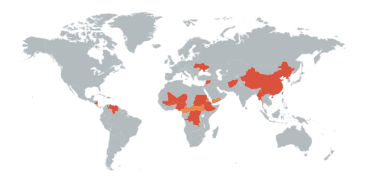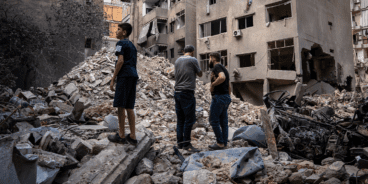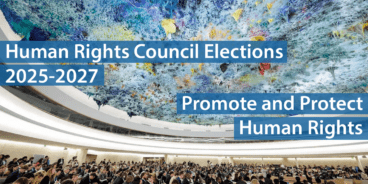
Atrocity Alert No. 66: Kenya, Central African Republic and Yemen
Atrocity Alert is a weekly publication by the Global Centre for the Responsibility to Protect highlighting situations where populations are at risk of, or are enduring, mass atrocity crimes.
Kenya
Yesterday, 8 August, Kenyans voted in general elections. Although voters also elected new county governors and members of the National Assembly, the race between the two main presidential candidates, incumbent President Uhuru Kenyatta and his rival Raila Odinga, was the main focus of political recriminations between the ruling coalition and opposition alliance.
Under Kenya’s electoral system, to win the Presidency a candidate must garner at least 50 percent of the total votes and must also receive at least 25 percent of the votes in half of the country’s 47 counties. If neither candidate receives over 50 percent, there will be a runoff election. At the time of publication, Kenya’s Independent Electoral and Boundaries Commission (IEBC) was reporting that Kenyatta was leading with around 54 percent of the vote.
In an interview with Al Jazeera on 4 August Odinga accused the government of a plot to manipulate the election and stated that the only way President Kenyatta’s party could win was through vote rigging. On 9 August Odinga publicly claimed the IEBC’s preliminary voting results had been hacked in Kenyatta’s favor by individuals using the credentials of an IT officer within the IEBC who was murdered last week. Many Odinga supporters responded to news of Kenyatta’s lead in the polls by protesting and barricading major roads. Protesters have clashed with police in several cities, including Kisumu and Nairobi, resulting in at least five people killed. Police have reportedly used live rounds and tear gas to disperse crowds.
A disputed outcome following the 2007 presidential election led to weeks of ethnic violence that claimed the lives of 1,133 Kenyans. Ten years later, as the IEBC tallies the votes it is essential that Kenyans maintain vigilance, particularly in regions that were identified prior to the election as potential hotspots for political violence or inter-ethnic conflict. All political leaders, especially Kenyatta and Odinga, should publicly denounce any incitement to violence, and encourage their supporters to respect the election process. Disputed results should be formally contested through appropriate legal channels in Kenya’s courts.
Central African Republic
On 7 August Stephen O’Brien, UN Under-Secretary-General for Humanitarian Affairs and Emergency Relief Coordinator, warned that “the early warning signs of genocide” are present in the Central African Republic (CAR) and that various armed groups “have the intention to ethnically cleanse” the country of their perceived enemies. Renewed fighting in the central and eastern parts of CAR has already displaced more than 180,000 people so far this year.
The situation is particularly tense in Bangassou, where around 2,000 Muslims have been sheltering in a Catholic church since violence in May, surrounded by members of a mainly Christian anti-balaka militia who are threatening to kill them. Fighting between anti-balaka and several ex-Seleka factions elsewhere in CAR, including Batangafo, Ngaoundaye, Kaga-Bandoro and Gambo, has reportedly resulted in the deaths of at least 60 people since 29 July.
Responding to these and other attacks, the UN peacekeeping mission in CAR (MINUSCA) is struggling to adequately protect civilians and has itself become a target. Since May nine UN peacekeepers have been killed in or around Bangassou. Humanitarian organizations have also been attacked and looted, forcing many to suspend delivery of the life-saving aid upon which nearly half the population depends. On 3 August six Red Cross volunteers were killed in Gambo.
The UN Security Council should immediately authorize additional troops for MINUSCA, with the focus on rapidly enhancing the mission’s capacity to meaningfully protect vulnerable civilians. The international community should also increase its financial and logistical support for the Special Criminal Court and help end impunity for mass atrocity crimes committed in CAR.
Yemen
On 4 August airstrikes in Yemen’s Saada governorate by the Saudi Arabia-led military coalition resulted in the death of at least 12 civilians. In response, the UN Humanitarian Coordinator in Yemen, Jamie McGoldrick, emphasized that “all parties to the conflict continue to show a disregard for the protection of civilians and the principle of distinction between civilians and combatants.”
The conflict in Yemen has killed over 10,000 people and has been characterized by repeated violations of international humanitarian law. It has also turned Yemen into the largest humanitarian crisis in the world. The destruction of civilian infrastructure and a severe economic crisis have left an estimated 18.8 million people – over two thirds of the population – in need of humanitarian assistance, while 7 million remain at risk of famine. Since a cholera outbreak began in May, over 470,000 cases have been reported and over 1,900 people have died. On 9 August the Norwegian Refugee Council reported that thousands of people have died due to their inability to seek medical treatment abroad as a result of the forced closure of airports and ports.
The UN Security Council (UNSC) has failed to adequately respond to the magnitude of the crisis facing Yemen. A substantive UNSC resolution has not been passed since April 2015, and peace talks have been stalled since August last year. None of the requests in a 15 June UNSC Presidential Statement have been implemented by parties to the conflict. The UNSC appears deeply divided and unable to address the related issues of mass atrocity crimes, humanitarian catastrophe and ongoing armed conflict in Yemen.
In keeping with the Arms Trade Treaty, states must stop arming and abetting parties to the conflict in Yemen who continue to commit war crimes and violate international humanitarian law. At the upcoming session of the UN Human Rights Council in September, members should mandate the establishment of an international commission of inquiry to investigate potential mass atrocity crimes committed in Yemen.
Related Publications


Atrocity Alert No. 414: Lebanon, Ethiopia and the UN Human Rights Council
